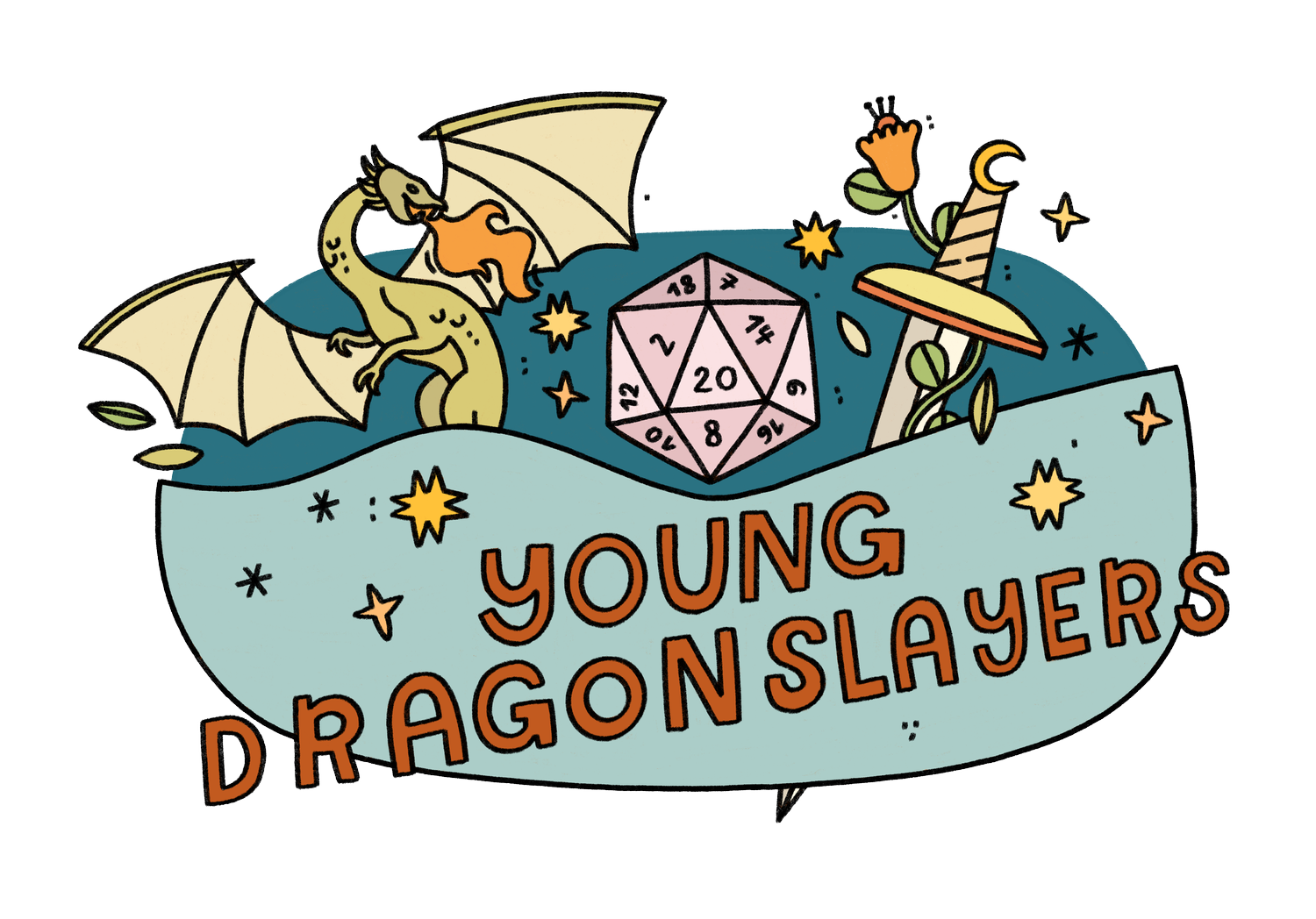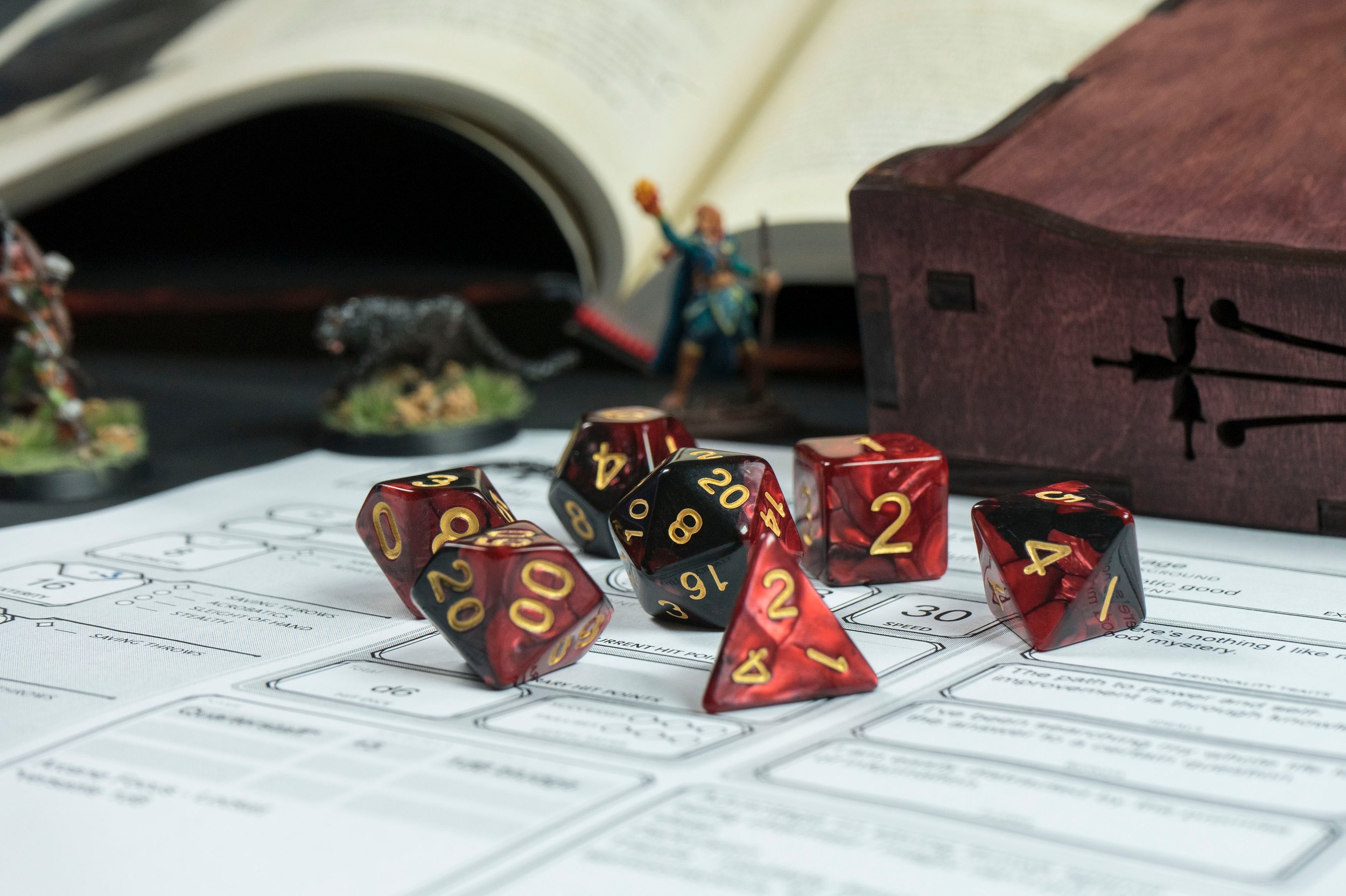How Does Dungeons & Dragons Work?
Just getting started in the game? We’ll help you find your people! Learn more about how D&D works online, its many social and educational benefits for kids, and how we help players find their perfect fit.
How D&D Works: The Basics
Has your child suddenly caught the D&D bug, but you’ve never played before? No worries! You’ve come to the right place. Dungeons & Dragons, sometimes called “D&D” or “DND”, is sort of like a choose-your-own adventure story brought to life. Players work together to tell a story, creating characters and then helping those characters navigate an adventurous fantasy world. D&D is categorized as a tabletop roleplaying game, or TTRPG: this just means that it’s a game you play seated at a table, while pretending to be somebody else.
Roleplaying games like D&D are different than familiar board games like Monopoly or Clue. You’re seated around a table, but that’s pretty much where the similarities end. For one thing, you’re not simply moving tokens around a board in D&D: it’s an open-ended story, with many possible endings depending on the choices you make. For another, you’re not just playing as the red token or the metal shoe. You’re creating a three-dimensional character with strengths, weaknesses, and wishes. You’ll spend a lot of time speaking in the first person as your character, too: “I brandish my sword and threaten the dragon,” “I investigate the abandoned carnival for traps.” If you were ever a theater kid, D&D is a little bit like improv.
On a basic level, D&D works like this: a lead storyteller called a Dungeon Master or Game Master is in charge of setting the scene: “You approach the enchanted forest, hoping to find your long-lost friend. It’s incredibly dark and quiet, and the only sound you can hear is faint, mysterious music.” After that, it’s up to each player to decide how their character would respond: do they run headfirst into the forest? Do they stop and search for clues and traps? Do they use a magical spell to create light? Once you’ve come up with an idea, you roll dice to see how well you do: there’s an element of random chance, so sometimes even the best plans don’t turn out the way you’d expect.
Of course, there’s all kinds of other cool stuff you can do, too: combat with enemies, solving riddles and puzzles, completing quests, and leveling up your character over time so they develop new abilities and powers. At its core, though, D&D is a game about creativity, problem-solving, teamwork, and a little bit of luck.
For a more detailed look at how to play D&D, check out “What is Dungeons & Dragons?”, our introductory video for new players.
What Are the Educational Benefits of D&D?
D&D is a fun creative outlet, but it’s also an opportunity to practice real-life skills. Our main goal is to have fun, but kids in our groups may notice that playing regularly helps them develop skills they can use outside of their gaming sessions. Because all the learning happens naturally through play, it doesn’t feel forced or awkward: kids are just having fun and trying new things in a low-stakes setting.
Playing the game requires quick arithmetic—you’re always adding and subtracting numbers from your dice. It also provides lots of opportunities to think about probability and chance in a way that’s appealing even if you’re not the most enthusiastic math student. A child’s reading skills will almost certianly get a boost, too: in addition to navigating their own character sheets, there’s a nearly endless supply of research to be done on monsters, spells, and lore. Our players and staff have even commented on how D&D has piqued their interest in other subjects, like historical periods, foreign languages, and musical genres. Playing D&D may open your child up to new interests they wouldn’t have otherwise dicovered.
In our experience, however, the biggest educational benefit of D&D is its ability to teach kids social-emotional skills. These are the kinds of “soft skills” that aren’t usually taught directly in school, but have a huge impact on our friendships, work, and general enjoyment of life. Through gameplay, kids naturally practice and develop a number of social-emotional skills, such as:
Assertiveness
Teamwork
Creative problem-solving
Public speaking
Conflict resolution
Perspective-taking
All of this social skill practice leads to increased confidence in social situations, both in and out of game. Which brings us to our next question…
What Are the Social Benefits of D&D?
One of the most magical things about D&D (in our humble opinion) is that it’s basically a friendship generator. It’s pretty hard to not grow to like the people you’re playing with, because the game sets you up to bond with each other. D&D requires teamwork, not competition. Rather than playing against each other, you’re looking for ways to use everyone’s unique skills to reach a common goal. You get to know your D&D group in a different way than you would if you were meeting in a classroom or in another activity. Going on an adventure together means you bypass most of the small talk and icebreakers, and jump into something a little more exciting right away.
Roleplaying—the bread and butter of D&D—increases empathy. You’re getting to see the world through someone else’s eyes and make choices that you might never make in real life. Practicing empathy makes it easier to take the perspective of other players, and tends to bring kids closer together. But roleplay has another friendship-building benefit, too: it takes the pressure off of social interactions. Playing as another character means you don’t have to worry so much about what you say and do. There’s no need to over-analyze your decisions: if you make a mistake or say something slightly awkward, who cares? It’s not you saying it—just your character.
The Benefits Sound Good—But Why Play D&D Online?
It can be a little intimidating to think about joining a group of strange kids online to play a game together. How will they find stuff to talk about? Will they have enough in common with each other? If your child had less-than-great experiences doing Zoom school, they may be wondering how online D&D works even if they’re eager to play the game. How exactly do you play D&D online—and why should you?
Playing D&D online isn’t too different from face-to-face play: you miss out on the tasty snacks, yes, but you also don’t need to bring pencils, paper, or expensive supplies. Because the game is imagination-based, it translates easily into the virtual world. Websites like Roll20 and DndBeyond allow players to create virtual versions of their characters: they can cast spells, change abilities, and even roll dice online.
We use both of these sites in our program, as well as Zoom, so we can see each other’s faces and hear everyone’s cool character voices in real time. We’ve found that players in our groups form genuine bonds and truly get to know each other, despite living in different cities, states, or even countries. While in person D&D will always be special, playing D&D online offers tons of benefits, too…and it’s much easier to get involved.
Who Should Play Online D&D?
Besides it being fun, there are a few scenarios when it makes sense to seek out an online group for your child or teen. It’s always fun to play D&D in person, but online games offer a few benefits that in-person sessions don’t. Your child might benefit from online Dungeons & Dragons if:
Your family recently moved, and your child is still figuring out their new social scene
Your child is homeschooled and looking for ways to spend time with peers
You live in a rural area, or someplace where there aren’t tons of local options for playing D&D
Your child feels less anxious meeting new people online
You need to stay home for health reasons
Your child has had a hard time finding people they click with at school
Playing online means our games are accessible to pretty much everybody, no matter who you are or where you live. If your child is nervous about meeting new people, online games can be a safe baby step toward socializing in-person. We find that many tweens and teens feel most comfortable hanging out with friends online, anyway, so it’s not quite so nerve-wracking to meet new people in a virtual game.
How to Find a D&D Group When None of Your Friends Play
If your child or teen is lamenting that they have nobody to play with, they aren’t alone. Most of our players arrive to our games solo. As popular as D&D is becoming, it’s still a fairly niche interest. Sometimes it’s hard to find other kids willing to cast wizard spells with you for a few hours if they haven’t already discovered the joys of tabletop gaming.
It can be disheartening to feel like nobody else likes the things you like. Many of our group members are just dying to be around other kids who share their interests. Finding a D&D group to play with can be more than just a fun activity. It reminds kids that they aren’t alone, and there’s a big community of like-minded people waiting for them just around the corner.
Even if it seems like there’s nobody interested in playing D&D in your neighborhood, there are plenty of other players out there looking to find each other. Since our groups meet online, we can cast a wide net and connect kids from all over the United States who might otherwise never get a chance to meet. Whether you’re in a small town, just moved to a new city, or your child just isn’t in a very geek-friendly crowd, you can find folks to play D&D with.
Playing D&D online definitely makes it easier to find like-minded friends: there are tons of websites for gamers created for this exact purpose! However, things get a little harder when the gamer in question is under 18. The internet is a great resource, but it comes with some safety risks, too. You don’t always know who you’re really talking to, and it can be a lot easier to bully somebody from behind a screen.
That’s where Young Dragonslayers™ comes in. We carefully pre-screen every player who joins our games to make sure that everyone has a positive, safe, socially affirming experience.
Fit Matters: Find a D&D Group That’s Right for Your Child
One of the toughest parts of getting started in D&D is finding the right group to play with. The game works best with at least 3 players, plus 1 game leader, so you need a decent number of friends to get started. It helps if those friends want to play the same way that you do: kids who want to smash bad guys and do cool moves in combat all day may not see eye-to-eye with someone who has lovingly created their character’s backstory and just wants to roleplay.
If you’re in the process of finding a D&D group for your child, here are a few questions to consider:
Is my child an introvert or an extrovert?
What kinds of stories, movies, and fandoms does my child love?
Is my child a seasoned D&D player, or just starting out?
When it comes to games, are they a diehard rule-follower or more interested in doing their own thing?
Does my child get along better with kids who are a little older or younger, or do they do best with same-aged peers?
What excites my child about D&D? Is it the roleplay, the combat, or something else?
Hopefully, these questions can guide you wherever you choose to find a group. If you decide to play with us, please let us know your answers! We’ll help you find a game master and group of peers that will mesh well with your child’s personality and interests.
We Can Help You Find a Safe, Friendly D&D Group
We don’t have a magic algorithm for sorting kids into groups with their future best friends…at least not yet. But we do try really hard to create groups of kids that we think have a high likelihood of getting along. We love to build balanced groups of introverts and extroverts, and connect kids who have similar styles of play or who share non-D&D-related interests. We tailor each group to match the interests and general vibe of the players, so no two groups are alike.
This means that rather than randomly assigning your child to a group, we’ll take a little bit of time to figure out the best fit. First, we’ll meet one-on-one to talk with you and your child. We want to get a sense of your child’s personality and what they’d like to get out of their D&D experience. You’re welcome to ask any questions you have, too.
After we meet, you’ll be invited to try out an Intro Class. These one-time games give brand new players a chance to learn the ropes before joining a weekly group, and allow more experienced players to see what it’s like to play with us. They’re a chance to try out our games before committing to a full 10-week program, and it’s helpful for us to see how players hit it off, too. Sometimes kids interact with peers really differently than they do with adults. Seeing players in action helps us make a better guess about what kind of group will be the best fit for your child.
Once we’ve met, we’ll let you know about available groups that your child might enjoy. Our groups run on a quarterly basis, so we open enrollment once per season. We’ll take your time zone and scheduling needs into account, as well as your child’s age, gender, and play style. Occasionally we have groups with a special focus, as well, such as all-girl groups or groups specifically for LGBTQ+ players. If your child ever feels like they haven’t quite landed in the right place, just let us know—we’ll switch things up or help them find a new group to join.
No matter what group your child lands in, we’ll make sure they’re in a safe, supervised, and fun environment that embraces all kids, and celebrates what makes them unique.
What Makes Our Online D&D Groups Different
Creating friendships through D&D is important to us. That’s why we approach all our games with the goal of deepening friendships and fostering social-emotional growth. We don’t want to turn our games into an after school special, but Game Masters are always keeping an eye out for opportunities to strengthen self-esteem, communication skills, and the bonds between players.
Our founder is a children’s therapist, so we know how important play, creativity, and friendship can be for a young person’s mental health. These games aren’t therapy, but we do think there are some therapeutic benefits to playing D&D, and we do our best to facilitate positive, inclusive social experiences where everybody feels welcome.
Several of our team members are parents, so we also take safety very seriously around here. We take steps to make sure that we’ve effectively screened all the children and employees who participate in our program. We also set ground rules with players to help everyone feel emotionally safe.
Here are a few qualities that set Young Dragonslayers™ apart from other online games:
Each game is supervised at all times by an adult facilitator who works professionally with children in their non-gaming life.
All facilitators submit to criminal background checks every 6 months.
We share pronouns in our first sessions and include diverse characters in our campaigns in order to welcome and support players of all genders and identities.
We offer modifications to support neurodivergent players.
We establish ground rules to promote safety and avoid potentially triggering content.
Our facilitators look for opportunities to encourage positive in-game social experiences, like altruism, teamwork, and compromise: we have a whole guidebook with ideas for how to do this!
Game content is tailored to the unique interests of each individual group, rather than following a pre-set storyline.
We hope kids leave our games feeling like they’ve learned a lot about D&D. But we also aim for genuine social experiences that help kids feel confident about their ability to make friends, both within our groups and in the world at large.
Ready to Play Some Online D&D With Us?
We hope you have a better idea of how our D&D programs work, and what it’s like to play with us. If you’re ready to get started, we’d love to have you! The first step is to get on our waiting list, so we have your application on file. Next, we’ll reach out to let you know about upcoming opportunities to meet with our staff and enroll in Intro Classes. We’ll also tell you when enrollment opens, so you can join a weekly group!
If you’re ready for your child to make some new D&D friends, here are your next steps:
1. Get on our waitlist, and let us know whether you’re interested in a child or teen group.
2. Meet for a one-on-one chat, and possibly try an Intro Class.
3. Play D&D with your new crew!
You can read more about our games for kids, teens, and groups below:
D&D for Kids | D&D for Teens | D&D for Groups | D&D Intro Classes
Wondering about something else? Check out our FAQ.





